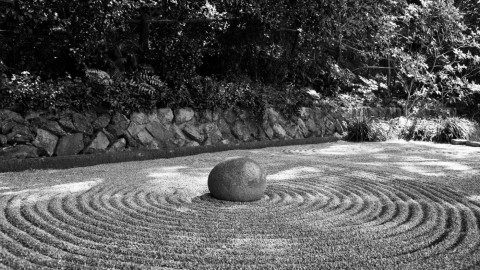Once Zen master Bankei spent several nights sitting under a crucifix in an execution ground, testing his Zen mind.
After that he lay down on an embankment surrounding a corral. Now it so happened that there was a warrior in the corral beating a horse. Seeing this, Bankei hollered, “Hey! What do you think you are doing?”
This happened three times before the warrior stopped and got off his horse. Approaching the Zen master, he now saw that Bankei was not an ordinary man. The warrior said, “You were yelling at me. Do you have something to tell me?”
Bankei said, “Rather than beat your horse for being unruly, why not chastise yourself and train your own mind right?”
Drop Analysis
The story says that Zen master Bankei was not meditating under crucifix in an execution ground. He was watching his mind.
The Zen way of life, ‘Walking in Zen, Sitting in Zen’ is not a philosophy. It has nothing to do with either Buddha’s philosophy or Taoist philosophy; and hence Zen is neither Buddhist, nor Taoist. It is the convergence of the Buddha’s experience and Lao Tzu’s experience.
By its very meaning and definition, meditation is mindlessness and making way for pure awareness to take over. That is the stage one gets into the realm of understanding by spiritual experience and not by any intellectual effort.
The word Zen is derived from the Pali word ‘dhyan’, pronounced ‘jhan’. It means concentration, which is the basis of meditation. Thus, Zen is a meditative system that enables one to go transcendental and see what one can’t see normally. It enables one to see and understand the reality of one’s nature, and one moves from multiple existence to the centre of One – the absolute truth.
Zen is the taste of reality here and now. It is the feel of the here and now. It is not concerned with any god after death. It is concerned with the godliness that surrounds you right here and now.
Simply put, one does not understand Zen by philosophical efforts. But it is not that easy to ‘banish away’ one’s mind to get into deep meditation. The mind plays a devilish role in meditation; and devils, as you know, are difficult to tackle. Thus, one can say Zen and mind are each other’s deadly enemies.
When Bankei hollered to the warrior, “Hey! What do you think you are doing?” He was saying to the warrior that don’t do any act unconsciously. Be alert towards yourself. According to the Zen when you are with a horse be with horse no need to beat the horse. Learn to be with a horse.
For Zen analysis is not needed. If you analyze, you will miss the diamond. Only look, just look. Become watchful, become very alert. Bring more awareness, but no analysis – just see. Even by watching and being with a horse you can be right here and now.
That’s what paradise is. That’s what heaven is. You are entering a different dimension: the caterpillar is growing wings.
But look. Understanding has nothing to do with analysis.
Learning from the story Zen Mind: Drop Analysis
Experience Learning
What is the difference between analyzing and understanding? Is it necessary to look at the past for understanding to happen?
There is a lot of difference, not only a difference, they are diametrically opposite.
Analyzing is a mind phenomenon, understanding is a non-mind phenomenon. Analyzing, you remain in the mind because you have to think. Analysis is thinking. Analysis is moving into reason, analysis is rational. Understanding has nothing to do with reason; understanding has nothing to do with thinking. Understanding is hovering above reason, moving beyond reason. Understanding is pure looking, just pure looking, with no idea to do anything. Analysis is not pure looking. There is preoccupation, you have to analyze it.
That is the whole difference between psychoanalysis and religion. Psychoanalysis teaches you analysis, religion teaches you understanding. If you go to a Freud or a Jung, he will teach you how to analyze your dreams, how to analyze your thoughts, how to sort it all out. If you go to a Buddha, he will simply teach you how to look, without any idea of doing anything; how to just look at the dream.
Don’t even call it a dream, because if you call it a dream, you have started analyzing. If you call it a dream, you have brought in a category of reason. You say it is a dream, it is no longer reality – analysis has started. You have categorized it, you have put it into a certain classification – analysis has started. Don’t even call it a dream. If you call it a beautiful dream, more analysis, and if you call it a nightmare, more analysis. Don’t say anything about it, don’t make any judgment. Just watch it, unconcerned; just look into it. And while looking into it without any concern, a great experience, an incredible experience, arises.
When you simply look, without even a single word standing between you and the object that you are looking at, the object starts disappearing. Like a cloud it starts disappearing. It goes far, far away; it recedes, goes back and back and back. And a moment comes when suddenly it is not there. You are left alone, without any content. This is what meditation is all about: to be conscious without any content. And the way to drop the content is not the way of analysis; it is the way of pure looking.
So there is no need to analyze. If you analyze, you are moving into a process which can continue ad infinitum. There is no end to it; one thing leads to another. If you analyze one dream, you will have to analyze your whole life, and then too the process is not finished. You will have to go back into your past lives. That has happened, in India that has happened.
Freud started something which was not a discovery, which was a rediscovery. Freud started analyzing, and then sooner or later many other things came in the wake of it: primal therapy. Once you start analyzing a single dream you had last night, sooner or later you will have to go back to your very birth scream because everything is connected. That dream was not just out of the blue. The dream that you saw last night is connected with many things in the past; you will have to analyze them. And, in their own turn, they are connected to something else. You will have to analyze them – and so on and so forth.
Tags: Drop Analysis Everything Is Included Flowing Life Heal Thyself Self-Remembering Separation Creates Illusions










